
Dark Cults is a two-player horror card game designed by Kenneth Rahman and published by Dark House in 1983.

Dark Cults is a two-player horror card game designed by Kenneth Rahman and published by Dark House in 1983.
The original game in 1983 was published with: [1]
In 1985, a 16-page magazine was added that included rules for 4 players in two teams; rules for solitaire play; supplementary cards; and a sample character sheet. [1]
Two players vie over the fate of a fictional character. One of the players takes the role of "Life" while the other plays as "Death". [3]
The players first choose who will play which role, Life or Death. Life gets more points for playing Locality, Neutral Character, and Escape cards; Death gets more points for Evil Character, Danger, and End cards. Both players receive the same number of points for playing Start, Save, Atmosphere, and Threat cards. [1]
The players draw one Story card each from the deck and then work together to invent a fictional character and background. Once the character has been created, Life draws another Story card, and then can either lay down one Story card on the table, tallying points for it; or pass on the opportunity to play. If Life plays a card, the player creates a narrative about the fictional character in keeping with the card played. [2] Death then draws a Story card and can either play a card or pass, adding to the narrative story if a card is played. Play alternates between the two.
Each Story card has a symbol indicating what types of Story cards can be played after it. For example, the Story card quoted above about Wallace meeting a former friend can only be followed by an Escape card or a Death card. [2]
Players who cannot play a legal card after drawing from the Story deck must pass, increasing the number of cards in their hand by one. A player can also pass in order not to play a card that would be advantageous to the other player. A player can only hold a maximum of five cards. If, due to several instances of passing, a player's hand grows to 6 cards, the player is penalized 3 points, and then discards any number of cards. Players also have an opportunity to discard any number of cards at the end of each story segment, when the protagonist escapes, is killed or is saved. [1]
Some Story cards have a symbol indicating that the next player must play a card from their hand before drawing a card from the Story deck. If the player is unable to play a legal card or has no Story cards, the player draws and plays a Pace card, which awards no points to either player. [1]
The game ends when the Story card deck is exhausted. If the protagonist is killed before the deck is exhausted, the players make up another fictional character and continue with the game. The player who has tallied the most points when the Story deck is exhausted is the winner. [1]
In the Jan-Feb 1985 edition of Space Gamer (Issue No. 72) Frederick Paul Kiesche III and Warren Spector liked the game, saying, "Dark Cults gets the highest recommendation. It is quite addictive, and can be used as inspiration for horror RPG scenarios. [...] Dark Cults isn't going to be everyone's cup of tea, but if you're a budding writer, or a roleplayer who enjoys the roles as much as the playing, or if you're just a lover of ghost stories, Dark Cults may be what the doctor ordered. Just don't play it in the dark." [3]
In the April 1989 issue of Games International (Issue #4), Paul Mason calls this "like no card game you ever played before." Mason believed that the great strength of the game lay not in the play of cards but in the narrative aspect, calling the points scoring "merely a sideshow to the main attraction." He did warn that the story-telling aspect would appeal to some and not others, saying, "It's certainly not one for the gamer who likes the anonymity of burying himself in piles of rules [...] You'll like the game in direct proportion to the extent you like exercising your imagination." He concluded by giving the game an above-average rating of 4 out of 5. [2]
In the April 1994 edition of Dragon (Issue 204), Lester Smith considered the game "worthy of attention", although he disliked the name Dark Cults since it "doesn’t really have much of anything to do with cults." Smith's only criticism of the game was that the story never ended on a satisfactory note since the game abruptly ended when the Story deck was exhausted. But he concluded by giving the game an above average rating of 5 out of 6, saying, "That is a relatively minor complaint to make, considering how much fun the game is overall." [1]

Everway is a fantasy role-playing game first published by Wizards of the Coast under their Alter Ego brand in 1995. Its lead designer was Jonathan Tweet. Marketed as a "Visionary Roleplaying Game", it has often been characterized as an innovative concept with limited commercial success. Wizards later abandoned the line, and Rubicon Games purchased it, and published several supplements. The line was sold again to Gaslight Press in February 2001. The line is currently with The Everway Company, which has released a Silver Anniversary Edition.
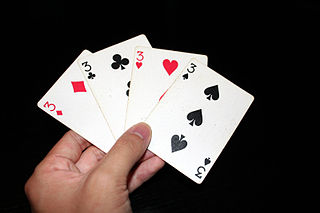
Gin rummy, or simply gin, is a two-player card game variant of rummy. It has enjoyed widespread popularity as both a social and a gambling game, especially during the mid twentieth century, and remains today one of the most widely played two-player card games.
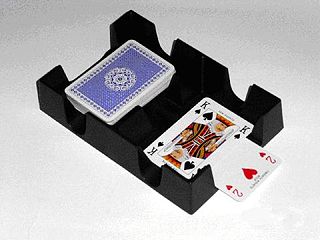
Canasta is a card game of the rummy family of games believed to be a variant of 500 rum. Although many variations exist for two, three, five or six players, it is most commonly played by four in two partnerships with two standard decks of cards. Players attempt to make melds of seven cards of the same rank and "go out" by playing all cards in their hands. It is "the most recent card game to have achieved worldwide status as a classic".

Crazy Eights is a shedding-type card game for two to seven players and the best known American member of the Eights Group which also includes Pig and Spoons. The object of the game is to be the first player to discard all of their cards. The game is similar to Switch, Mau Mau or Whot!.
Star Wars: Customizable Card Game (SW:CCG) is an out-of-print customizable card game based on the Star Wars fictional universe. It was created by Decipher, Inc., which also produced the Star Trek Customizable Card Game and The Lord of the Rings Trading Card Game. The game was produced from December 1995 until December 2001. Since 2002, the game has been maintained by the Star Wars CCG Players Committee, with new virtual cards being released every few months and the capability to play both in person and online.
Spite and malice, also known as cat and mouse, is a relatively modern American card game for two or more players. It is a reworking of the late 19th-century Continental game crapette, also known as Russian bank, and is a form of competitive solitaire, with a number of variations that can be played with two or three regular decks of cards.

The Yu-Gi-Oh! Trading Card Game is a collectible card game developed and published by Konami. It is based on the fictional game of Duel Monsters created by manga artist Kazuki Takahashi, which appears in portions of the manga franchise Yu-Gi-Oh! and is the central plot device throughout its various anime adaptations and spinoff series.

Doomtown: Reloaded is an expandable card game based on the Deadlands role-playing game. It was originally a collectible card game that ran from 1998 through 2001 and was revived as the Reloaded version in 2014. It was published by Wizards of the Coast (WotC) under license to Pinnacle Entertainment Group until January 2000, when WotC quit production and the license transferred to Alderac Entertainment Group.

Mau-Mau is a card game for two to five players that is popular in Germany, Austria, South Tyrol, the United States, Brazil, Greece, Czech Republic, Slovakia, Israel and the Netherlands. Mau-Mau is a member of the shedding family, to which the game Crazy Eights with the proprietary card game Uno belongs. Other similar games are Whot! or Switch. However, Mau-Mau is played with standard French or German-suited playing cards.

Bang! is a Spaghetti Western-themed social deduction card game designed by Emiliano Sciarra and released by Italian publisher DV Giochi in 2002. In 2004, Bang! won the Origins Award for Best Traditional Card Game of 2003 and Best Graphic Design of a Card Game or Expansion.
Yaniv, also known as Yusuf, Jhyap, Jafar, aa’niv, Minca or Dave, is a card game popular in Israel. It is a draw and discard game in which players discard before drawing a new card and attempt to have the lowest value of cards in hand. The game is considered a backpackers game in Israel, and it's popular among soldiers and young adults returning from long backpacking trips.
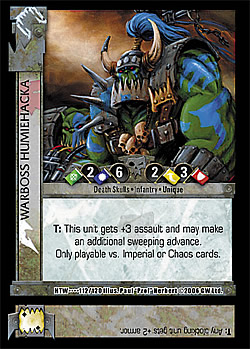
Dark Millennium is an out-of-print collectible card game. It's the successor to the Horus Heresy and set in the fictional Warhammer 40,000 universe. The base card set was launched in October 2005 by Sabertooth Games.

Brisca is a popular Spanish card game played by two teams of two with a 40-card Spanish-suited pack or two teams of three using a 48-card pack.
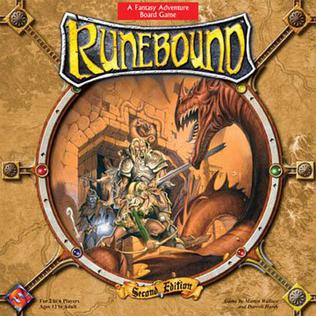
Runebound is a high fantasy adventure board game created by Martin Wallace and Darrel Hardy and published by Fantasy Flight Games in 2004. A second edition was published in 2005. A third edition was released in 2015. In Runebound, one to six players take the roles of adventurers who seek out quests. The quests are then resolved with either victory for the player, or a loss of some item. Each player is seeking quests and trying to gain experience which results in greater power and combat skill.

Urban Rivals is a massively multi-player online virtual trading card game. The game features over 2,000 characters with varying rarities and abilities to discover, collect and level up by fighting live against players from all over the world. It also has an active market, where players can buy cards from other players or put their own cards up for sale.
Android is an adventure board game designed by Kevin Wilson and Dan Clark, published in 2008 by Fantasy Flight Games. Set in a dystopian future, where the Moon is colonized and androids and clones are real, players take on the roles of murder investigators, investigating a murder within the fictional cities of New Angeles and Heinlein, a colony on the Moon. Players attempt to gain Victory Points by solving the murder, solving the conspiracy, and/or resolving the investigators' personal issues. The player with the most Victory Points wins the game.
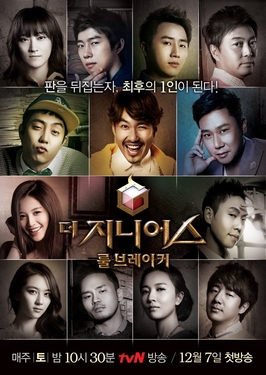
The Genius: Rule Breaker is the second season of The Genius, which debuted on tvN on December 7, 2013.

Legends of the Three Kingdoms, or sometimes Sanguosha, LTK for short, is a Chinese card game based on the Three Kingdoms period of China and the semi-fictional 14th century novel Romance of the Three Kingdoms (ROTK) by Luo Guanzhong. The rules of the basic LTK are almost identical to the rules of the older Italian card game Bang!. LTK was released by YOKA games (游卡桌游) on January 1, 2008, and has been followed to date by a total of seven official expansion sets, an online version LTK Online, as well as a children's version LTK Q Version. There are self-created cards by players, but these are mostly unofficial.

The Final Fantasy Trading Card Game, often abbreviated as Final Fantasy TCG or FF-TCG, is a trading card game developed by Hobby Japan and published by Square Enix. The first iteration was released in Japan in 2011 but never released outside Japan and was discontinued in order to release a second iteration worldwide in October 2016.

Inscryption is a 2021 roguelike deck-building game developed by Daniel Mullins Games and published by Devolver Digital. Directed by Daniel Mullins, it was originally released for Windows on October 19, 2021, and on Linux, macOS, PlayStation 4, PlayStation 5, Nintendo Switch, Xbox One and Xbox Series X/S over the following two years. The game puts the player in a cabin where a mysterious gamemaster makes them play a tabletop game.